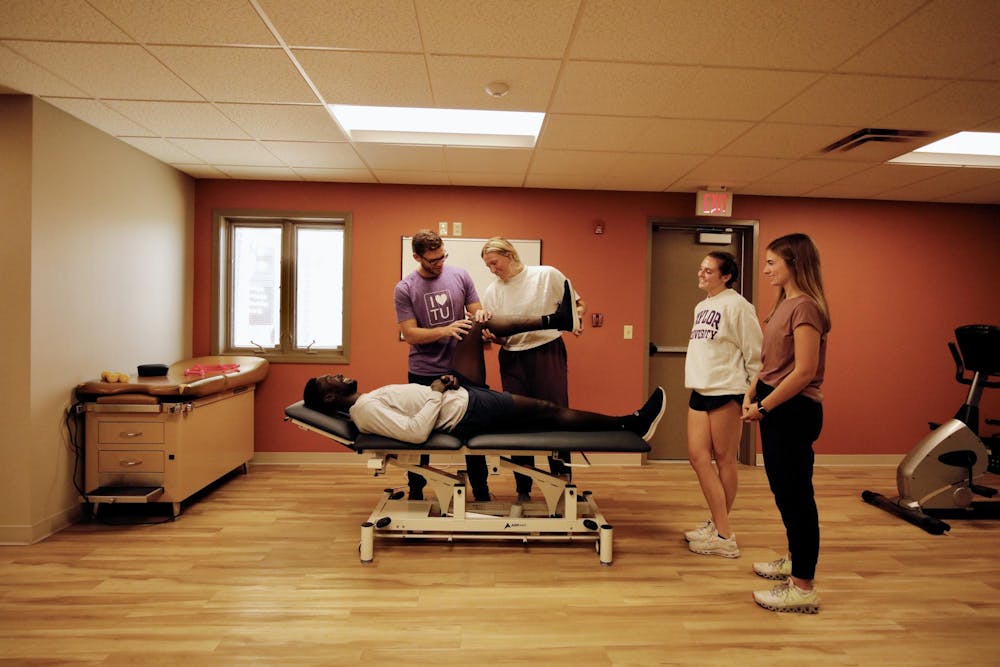On the south side of Main Street’s medical center, a temporary sign taped to the door reads “131: Physical Therapy Classroom.”
Between the hours of 11 a.m. and 1 p.m. every Tuesday and Thursday, members of the Taylor community rotate through the storage room-turned-classroom: benefitting from the new course offered to upperclassmen interested in the field of physical therapy.
EXS 370, or PT as a Profession, is a one-credit-hour class designed to build on courses like Anatomy & Physiology — lending hands-on experience to the technical knowledge learned in the initial years of Taylor University’s Kinesiology program.
To preserve the educational focus and simplify operations of the clinic, the department chose to create a class rather than a full-fledged PT clinic. Though the class still meets professional industry standards and follows Indiana’s comprehensive practice laws, the administration processes are minimized; this allows Assistant Professor of Kinesiology Scott Fenstermacher more time to focus on students.
Students are divided into four groups — with four to five students per group — and assigned a weekly clinical hour. On Tuesdays and Thursdays, students move through the classroom alongside clients from the community. The only constant presence in this biweekly rhythm is Fenstermacher: shifting from person to person, leading evaluations, describing routines, demonstrating specific exercises, explaining technical terms to students and answering questions as they come up.
Senior Exercise Science major Julie Kim’s clinical slot falls on Tuesdays at 11 a.m. Kim said that each student is assigned a patient’s chart and instructions at the beginning of the hour. Though treatment plans are developed and explained by Fenstermacher (the licensed practitioner), students are given a chance to lead clients through the suggested routines.
Brandon Dykstra, the department co-chair and assistant professor of kinesiology, emphasized the value of offering students this firsthand experience.
“For the Kinesiology department, the clear benefit is giving students a hands-on, focused opportunity to learn about PT from a physical therapist doing actual physical therapy for actual people,” Dykstra said. “They have these opportunities if they do an internship, but an on-campus class like this is new to Taylor and extremely rare at other undergraduate institutions.”
Born from Fenstermacher’s background in both physical therapy and clinical education, the hoped-for outcomes of EXS 370 are twofold: to better equip students interested in the PT profession and to serve the Taylor community.
Students’ academic and theological growth is the primary emphasis of the class.
As they step away from undergraduate studies, one of the biggest challenges for graduate students interested in physical therapy is the transition from classrooms to a clinical setting. Additionally, Fenstermacher notes that most students’ initial clinical experiences are fast-paced and observational.
“You're going from patient to patient to patient to patient, right?” Fenstermacher said. “And it's really hard to slow down and have the therapist explain what's going on, you know — so I wanted to have a place where students could learn; (where) I could stop and take a moment to explain, ‘Hey, this is what I'm saying, this is what I'm feeling, this is kind of how it fits together.’”
In preparing students to enter clinical settings more confidently, EXS 370 equips them to be better graduate students.
Ultimately, however, the clinic-classroom prepares students to be better professionals.
“This really gives me a firsthand look at what I should expect when I end up going into the field or when I start shadowing or when I start interning,” Kim said.
Fenstermacher also desires to weave theology of ministry into the program — encouraging students to begin viewing physical therapy (and related professions) as vocational callings that partner with God in his healing ministry to the created world.
The secondary (but no less significant) purpose of the program is to serve the Taylor community through screenings, evaluations and treatments.
The goal is not to provide every client with full, comprehensive physical therapy but to offer the limited services possible in a classroom setting and refer clients elsewhere when necessary.
“I love the 50 minutes that I'm in there; I love interacting with patients,” Kim said. “I love just having that one-on-one with the patient — having a conversation with them and then just knowing that these little minor exercises that may be easy for us (are) hard for them, but it's helping them a lot.”
Those interested in participating as clients can contact Fenstermacher at scott_fenstermacher@taylor.edu or department assistant Sonya Martinez at sonya_martinez@taylor.edu. Though initial appointments and evaluations are free, recurring sessions are accompanied by a $20 administrative fee. Clients are given a questionnaire and asked to sign disclosure and consent forms, along with a financial responsibility statement.
With 20 clients already involved in the program, and interest climbing, Fenstermacher has considered the idea of a wait list if client numbers begin to exceed class capacity.
Looking ahead to the future of EXS 370, Fenstermacher notes that the class will be offered in the spring semester, after which it will undergo approval from Taylor's committee.
The hope is that PT as a Profession will be self-sustaining in the long term, using client fees to make the program financially independent of department resources.
“Dr. Fenstermacher is very enthusiastic about the class, the Kinesiology Department is very enthusiastic about the class and most importantly, the students are very enthusiastic about the class. It's been a great success,” Dykstra said.




